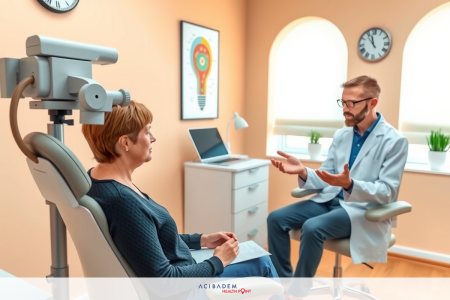Herpes Simplex Keratoconjunctivitis Treatment Options
Herpes Simplex Keratoconjunctivitis Treatment Options Herpes simplex keratoconjunctivitis is a viral eye infection. It is caused by the herpes simplex virus. This infection affects the cornea and conjunctiva, causing discomfort and vision problems.
Patients need to see healthcare professionals for a treatment plan. They will get advice on how to handle the infection. There are many ways to treat this, like antiviral drugs and special eye drops.
These treatments help ease symptoms and protect your vision. They also help stop the infection from coming back. Getting the right treatment is key to keeping your eyes healthy.
Understanding Herpes Simplex Keratoconjunctivitis
Herpes simplex keratoconjunctivitis is a serious eye problem. It happens when both the cornea and the conjunctiva get inflamed. This is usually because of the herpes simplex virus type 1 (HSV-1). If not treated, it can really hurt your vision.
What is Herpes Simplex Keratoconjunctivitis?
This eye disease is caused by HSV-1. It makes the cornea and conjunctiva inflamed and damaged. It’s often mixed up with other eye infections like viral conjunctivitis. But, it’s different because it comes from the herpes simplex virus. If not treated right, it can cause big problems.
Causes of Herpes Simplex Keratoconjunctivitis
Touching the herpes simplex virus can cause this eye disease. This can happen when you touch a cold sore and then your eyes. The virus can hide in your body and wake up when you’re stressed or your immune system is weak. Knowing why it happens helps us avoid it.
Who is at Risk?
People with weak immune systems are more likely to get this eye disease. Those who have had herpes simplex before are also at higher risk. Plus, folks who often get viral conjunctivitis or other eye problems might be more at risk. Keeping clean and treating herpes infections early can lower the risk of this serious eye issue.
Symptoms Associated with Herpes Simplex Keratoconjunctivitis
It’s important to know the symptoms of herpetic eye disease. Spotting these signs early can help treat it right. This can tell it apart from other eye problems.
Common Symptoms to Watch For
People with herpetic eye disease often show certain symptoms. These include:
- Redness and swelling in the eye
- Sharp pain or a burning sensation
- Increased tearing or discharge
- Blurred vision
- Sensitivity to light (photophobia)
These signs can make everyday tasks hard and hurt your life quality. It’s important to get them checked out fast.
Differences Between Initial and Recurrent Infections
It’s key to tell initial and later infections apart. First-time infections usually show up more clearly. They bring strong pain, swelling, and redness.
Later infections are often milder. They might feel similar but aren’t as bad. They have less pain and less redness. Doctors need to know this to treat you right.
| Infection Type | Symptom Intensity | Common Symptoms |
|---|---|---|
| Initial Infection | High | Severe redness, sharp pain, significant tearing |
| Recurrent Infection | Moderate | Mild pain, less pronounced redness |
Knowing these symptoms well helps doctors treat you right. It also makes sure you’re not mistaken with another eye problem.
Diagnosing Herpes Simplex Keratoconjunctivitis
Getting a quick and right diagnosis is key for treating Herpes simplex keratoconjunctivitis. Doctors use tests, exams, and lab work to make sure they get it right. Let’s look at how they do it.
Diagnostic Tests
Tests are very important to confirm if you have Herpes simplex keratoconjunctivitis. Doctors take swab samples from your eyes for tests. These tests look for the herpes simplex virus directly.
Clinical Examination
A doctor will closely check your eye during a clinical exam. They might use a special lamp to look for signs like ulcers or lesions. This helps them see the infection clearly.
Laboratory Confirmation
Lab tests help make sure the diagnosis is correct. They use tests like viral culture and PCR to find the virus’s genetic material. These results help doctors make the best treatment plan.
Using tests, exams, and lab work together helps doctors diagnose Herpes simplex keratoconjunctivitis well. This leads to the right treatment and care.
Immediate Steps to Take After Diagnosis
When you get a herpes simplex keratoconjunctivitis diagnosis, act fast. Start the right treatment to ease symptoms and protect your eyes. Your eye doctor will tell you what to do first.
- Adherence to Strict Ocular Hygiene: Keep your eyes clean to avoid more problems. Wash your hands often and don’t touch your eyes too much.
- Discontinue Contact Lens Wear: Stop wearing contact lenses right away. This lowers the chance of eye irritation or infection.
- Initiate Antiviral Therapy: Start taking antiviral medicine as your doctor says. This is key to managing the disease.
- Monitor and Educate: Learn why watching your symptoms and going to follow-up visits is important. This helps you take good care of your eyes.
| Immediate Action | Reason | Expected Outcome |
|---|---|---|
| Strict Ocular Hygiene | Prevent further complications | Reduced risk of additional irritation |
| Discontinue Contact Lens Wear | Avoid additional irritation | Decrease in infection risk |
| Initiate Antiviral Therapy | Control disease progression | Alleviation of symptoms |
| Monitor and Educate | Ensure adherence to care guidelines | Effective management and recovery |
By taking these steps right away, you can help your eyes get better. This makes managing herpetic eye disease and after diagnosis care more effective.
Antiviral medication is key when fighting herpes simplex keratoconjunctivitis. These drugs help control the infection. They also lessen symptoms and prevent eye problems.
Doctors often prescribe certain antiviral drugs for this condition. These include:
- Acyclovir
- Valacyclovir
- Famciclovir
These drugs are great for treating eye herpes. They are suggested by doctors.
Antiviral drugs stop the virus from making more copies. This slows the infection. It makes symptoms less severe and helps healing.
For herpes simplex keratoconjunctivitis, taking these drugs on time is important. It helps get the best results.
Possible Side Effects
Antiviral drugs are usually safe but can have side effects. Common ones are:
- Mild discomfort
- Headache
- Gastrointestinal problems
If you have big side effects, talk to your doctor. They can help manage your treatment and reduce risks.
Topical Treatments and Eye Drops
Using eye drops and topical treatments can help with herpes simplex keratoconjunctivitis. This part talks about different treatments, how to use them, and possible side effects.
Types of Topical Treatments
There are special eye drops and ointments for herpes. They help fight the virus. Some common ones are:
- Trifluridine
- Ganciclovir
These medicines work right on the infected area. They lessen symptoms and prevent more problems.
How to Use Eye Drops
Using eye drops right is key for them to work well. Here’s how to do it:
- Wash your hands before using the drops.
- Shake the bottle if needed.
- Pull down your lower eyelid to make a pocket.
- Put the drops in the pocket without touching your eye.
- Close your eye and press on the inner corner for a minute to keep the drops in.
Following these steps makes sure the eye drops work best. They help treat keratoconjunctivitis.
Potential Side Effects
Most of the time, these treatments are safe. But, some people might have side effects. These can include:
- Local irritation
- Foreign body sensation
If you have bad side effects, see your eye doctor right away. Knowing about these can help you manage your treatment better.
Oral Medications for Herpes Simplex Keratoconjunctivitis
Oral meds are mostly for serious or often coming back herpes simplex eye infections. They help keep outbreaks less frequent and less severe. This keeps your vision and eye health safe.
When are Oral Medications Prescribed?
Doctors give oral meds when eye creams don’t work or if you’re at high risk of serious disease. They help manage eye infections that come back a lot or badly. They’re also for people with widespread disease or who don’t get better with creams.
Common Oral Medications
There are several oral antiviral drugs for herpes simplex keratoconjunctivitis. These include:
- Acyclovir: Often the first choice, acyclovir cuts down on viral shedding and helps with acute episodes.
- Valacyclovir: A form of acyclovir, valacyclovir is taken up better by the body. It’s used for treating and preventing outbreaks.
- Famciclovir: This antiviral drug is also used for treatment and prevention. It’s given in doses like acyclovir.
Drug Interactions and Side Effects
It’s important to watch for drug interactions and side effects with oral meds. These can affect other drugs you’re taking, like those for your kidneys or your immune system. Side effects might include stomach issues, headaches, or rarely, kidney problems. Checking with your doctor about all your medicines and health can help avoid these issues.
| Medication | Usual Dosage | Common Side Effects |
|---|---|---|
| Acyclovir | 400 mg 2-5 times daily | Nausea, headache, dizziness |
| Valacyclovir | 500 mg 2-3 times daily | Abdominal pain, headache, fatigue |
| Famciclovir | 250 mg 2-3 times daily | Headache, fatigue, diarrhea |
Role of Acibadem Healthcare Group in Treating Herpes Simplex Keratoconjunctivitis
Acibadem Healthcare Group leads in treating herpes simplex keratoconjunctivitis. They offer a complete and personal way to help patients. They use the latest tests to find the problem early and accurately.
This is key for managing the eye condition well. They mix advanced tech with expert knowledge for custom treatment plans. These plans meet each patient’s special needs.
Services Provided
Acibadem Healthcare Group gives many services. These include detailed tests, special antiviral treatments, and ongoing care. Their team has skilled eye doctors and support staff working together.
This team works to fix symptoms now and stop future problems. They focus on keeping eyes healthy for a long time.
Patient Success Stories
Many patients have gotten better thanks to Acibadem Healthcare Group. They say their quality of life has improved a lot. These stories show how well Acibadem’s care works.
They focus on caring for each patient with herpes simplex keratoconjunctivitis. Acibadem Healthcare Group is a top choice in eye care.
FAQ
What is Herpes Simplex Keratoconjunctivitis?
Herpes Simplex Keratoconjunctivitis is a viral eye infection. It's caused by the herpes simplex virus, usually HSV-1. It affects both the cornea and conjunctiva. Symptoms include redness, pain, tearing, and sensitivity to light.
What causes Herpes Simplex Keratoconjunctivitis?
This condition is caused by the herpes simplex virus type 1 (HSV-1). It can spread through direct contact with the virus. People with weak immune systems are more likely to get it.
Who is at risk for developing Herpes Simplex Keratoconjunctivitis?
People at higher risk include those with weak immune systems. Those with a history of HSV infections or direct virus exposure are also at risk. It can come back in those who've had it before.













